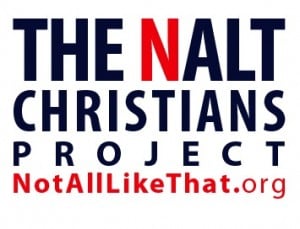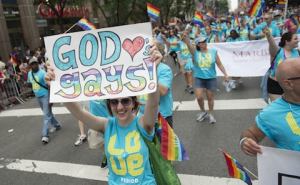 I appreciate and affirm the NALT Christians project, the idea of stating over and over again in public that not all Christians are “like that” … homophobes and sexists to be precise. A big part of why I started writing and speaking more about issues like marriage equality and reproductive justice in recent years was in fact to untangle the hold that right-wing and conservative evangelical Christianity has when it comes to public god-talk and the politicization of sexuality.
I appreciate and affirm the NALT Christians project, the idea of stating over and over again in public that not all Christians are “like that” … homophobes and sexists to be precise. A big part of why I started writing and speaking more about issues like marriage equality and reproductive justice in recent years was in fact to untangle the hold that right-wing and conservative evangelical Christianity has when it comes to public god-talk and the politicization of sexuality.
So in some way, every time I write about being pro-faith and pro-choice, I’m saying that Christians are not all “like that.” Every time I point out that what Jesus had to say about homosexuality can be summed up in zero words, I’m saying that Christianity doesn’t have to be “like that.” More of us need to do this work and do it more. This is all true and good
And yet … something about this project raises other questions for me. (For others’ questions, check out some of the comments here.) Yes, we’re not all like that, but Some Still Are. We share a tradition and even sacred texts with people who use them for very different purposes. We share a name with communities who exclude our neighbors for whom they love. We think we are right. They think they are right. Is the line between “we” and “they” so clear and definitive after all? Is it permanent and fixed? Certainly we hope not.
And, What About You? Alison Amyx shared “An Open Letter to NALT Christians” over at Believe Out Loud, in which she welcomes allies to the conversation, and encourages all of us to get honest about our continued complicity in multiple systems of oppression and inequality:
The problems we are here to address are big, in fact—they are bigger than any one of us. We are all taught homophobia and transphobia in our culture, similar to the ways we are taught racism, mysogony, and other forms of oppression.
We are all a part of these systems, and we all play a role in their survival—whether we are harmed by these forms of oppression, hold oppressive beliefs, or behave in oppressive ways. Most of us play all of these roles at various points in our lives.
No one is completely blameless when we all live enmeshed in systems and institutions that oppress and privilege us, occasionally without our knowledge and consent. So, Alison continues:
The truth is, all of us are a little bit “like that.” When I am honest with myself, I know I still hold stereotypes and participate in systems of oppression. The “us vs. them” narrative in the NALT framework erases people who are still on their journey toward inclusion.
At its worst, this negative framework encourages the bullying of Christians and others who disagree with our stance on LGBTQ equality. I have already seen the effects of this in online spaces as people who disagree with NALT’s message are pushed out of the conversation.
I am an ally to many communities, and I know overcoming internalized oppression is a difficult and lifelong journey. My own coming out was my first act of undermining homophobia, and I take steps every day to challenge the many internalized -isms I have been taught my entire life.
Saying we are “not like those other Christians” is a lie; these systems of oppression are deeply rooted in all of us. As Christians, we are called to overcome these systems in both ourselves and our communities as we work to build love and inclusion into our churches, our denominations, and our world.
Being an ally is about much more than telling people who we are not—it means showing the world who we are.
I appreciate the way that Alison frames this as a much more complicated issue. It’s just too easy to say we’re right and they’re wrong (even if I wholeheartedly think we are, … and they are) because it allows us to escape penalties for all the ways in which we continue to be wrong on other things.
I also appreciate the insistence on continuing to show the world who we are, to live it out. Alison goes on to talk about what allies can and should DO:
So where should allies start? The first step I always take is listening to the communities with whom we are in alliance. This means letting go of our defenses, being honest with ourselves about the ways we do harm, and committing to changing our behaviors.
For more steps, suggestions, and resources, please head over to the full piece here.
Because yes, Not All Christians are Like That, but Some Still Are, and What About You?












